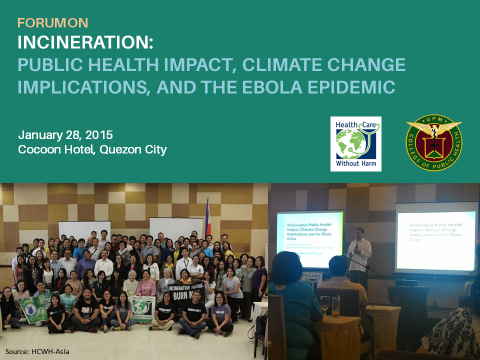OML Center Participates in a Forum on Incineration

Effectiveness Of Insurance For Disaster Risk Reduction And Climate Change Adaptation: Challenges And Opportunities
December 9, 2016
HCWH-Asia is Partnering with OML Center on Climate and Health Initiatives
December 9, 2016by AV Gabriel
The OML Center participated in a forum on “Incineration: Public Health Impact, Climate Change Implications and the Ebola Epidemic” last 28 January 2015 at the Cocoon Boutique Hotel, Scout Tobias corner Scout Rallos, Q.C. The event was organized by Health Care Without Harm – Asia (HCWH-Asia) in partnership with the University the Philippines Manila (UP-Manila) College of Public Health. This forum was one of the activities organized in celebration of the Zero Waste Month.
Dr. Jorge Emmanuel served as the speaker in the forum. According to HCWH-Asia, this forum was “the first of its kind in the Philippines where pressing concerns on Ebola [was] discussed by a top international expert.” Among his works on the Ebola crisis, he was part of the team of the World Health Organization who drafted the interim guidelines on the management of Ebola waste. He also worked as a medical waste consultant for various international organizations, among others across the world.
The event served as a venue wherein members from the health care sector, media, government, NGOs, professional organizations, private sector and the academe were able to discuss and learn about the hazards and implications of incineration in terms of public and environmental health. This is in relation with the Ebola crisis where infectious wastes were incinerated.
The presentation of Dr. Emmanuel showed that incineration is not the most efficient way to dispose infectious wastes as this brings more harm to the environment and public health through the release of greenhouse gases, dioxins, particulate matter, etc. According to Dr. Emmanuel, the Philippines is not ready for incineration especially on meeting international standards and enforcing strict monitoring of the toxic by-products of the incineration process.
As an alternative, Dr. Emmanuel showcased his successful studies on the use of autoclave machines to disinfect medical wastes. This technique could provide the same volume of treated waste with lower net costs and no production of hazardous by-products.

